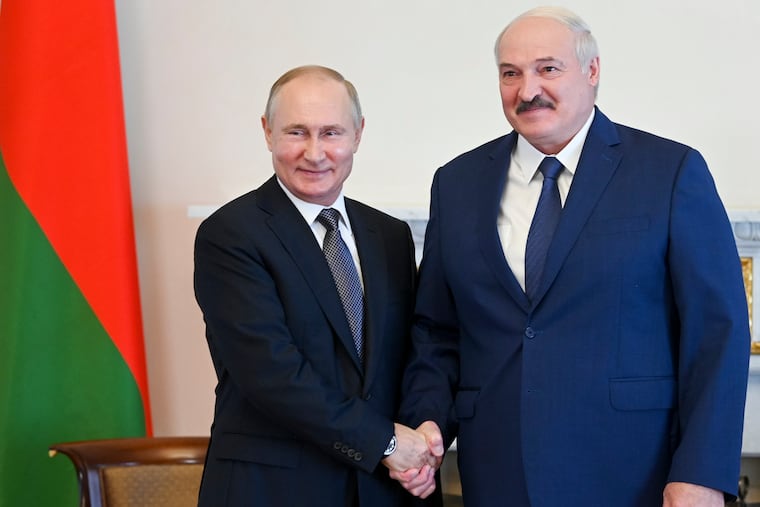Don’t let U.S. focus on China allow Putin to get away with invasion of Ukraine | Trudy Rubin
Vladimir Putin is testing whether the West will let him seize more territory and use gas cutoffs and refugee flows to intimidate Europe.

While President Joe Biden has been trying to tamp down tensions with China, Vladimir Putin has been busy perfecting a new form of warfare against the West.
The White House had hoped to put Russia on the back burner while it focused on America’s far more dangerous rivalry with Beijing. But Putin, ever eager to grab the global limelight, has amassed 80,000 troops on the Ukrainian border, threatened to limit gas for Europe, and abetted the callous misuse of refugees by Belarus as a weapon against Poland.
A nibble here, a bite there, the use of misinformation, cyberhacking, blackmail, human trafficking, proxy wars — all are part of Putin’s arsenal to attempt to destabilize Europe and America while denying any involvement. And the West has yet to figure out how to check him.
Some call it “hybrid war,” but I think of it as “salami war.” Putin is biting off bits until the sausage is half gone in an effort to destabilize democracies while forcing America and the European Union to accept his dominance over chunks of Europe.
“The White House notion of making Russia more dependable so it can work on China isn’t working out so well,” I was told by Alexander Vershbow, who served as U.S. ambassador to Moscow and deputy secretary general of NATO. “We may want to park Russia on the back burner but Putin has other ideas.”
Putin pursues his salami war in stages, taking more bites whenever NATO allies are distracted.
» READ MORE: Secretary Blinken, don't betray Afghan allies and U.S. vets | Trudy Rubin
He doesn’t hide his desire to gobble up an independent and democratic Ukraine. Since he invaded Ukraine in 2014 and annexed Crimea, he has continued to destabilize that country to prevent it from moving closer to the European Union.
He sent Russian troops, proxies, and weapons to occupy the Donbas region of eastern Ukraine in 2014, and paid no political price when those proxies shot down a civilian Malaysian airliner with Russian missiles.
NATO allies fear Putin may actually be massing those troops for another military incursion. “What Putin is really doing is testing how much solidarity there is in the West,” I was told by former National Security Council Russia expert Fiona Hill. “The big question: Does he go too far and trigger a massive response?”
Similarly, Putin is testing whether Europe will let him get away with blackmailing the continent over gas — and refugees.
Europe is overly dependent on Russian gas at a time when it is struggling with energy shortages. Both the Trump and Biden administrations had warned Germany not to endorse a second gas pipeline from Russia, known as Nord Stream 2, because it would increase dependency on Moscow. Biden mistakenly dropped his opposition months ago as a favor to Germany, but the German government promised to rethink if Russia attempted to “use energy as a weapon.”
Now Putin has baldly warned that he will increase Russian gas shipments only if Germany immediately certifies the Nord Steam 2 pipeline. Germany’s energy regulator has temporarily halted pipeline approval, but the German government hasn’t frozen the project.
“How much more explicit can Putin be about blackmail?” asks Hill. “The ball is in the European court.”
Putin’s latest weapon against Europe is human trafficking. His closest ally, President Alexander Lukashenko of next-door Belarus, has organized visas for desperate Iraqis and Afghans and had them transported to the border with Poland. This would be highly unlikely without a Kremlin green light.
The aim is to pressure Europe to drop sanctions against Belarus for rigged elections. (Lukashenko also got away with air piracy, forcing an Irish civilian airliner to land so he could kidnap a Belarusian dissident off of it.) As the man who keeps Lukashenko in power, Putin cannot separate himself from these crimes.
Putin doesn’t care. He has refused to stop the operations of Russian criminal cyberhackers, despite visits by U.S. officials with lists of the culprits. No one doubts that these criminals could only operate with a Kremlin green light.
So despite efforts by the Biden team to seek areas of accord with Moscow, after a June Putin-Biden meeting in Geneva, engagement must not preclude pushback.
“Putin is clearly testing the limits of what he can get away with,” says Vershbow. Europe and cyberspace are the testing grounds. (The Kremlin is so risk-happy that Moscow just conducted an anti-satellite missile test that endangered the International Space Station, including Russian members of the crew.)
“We should do more to push back,” says Hill. One place to start would be a Biden-Merkel decision to freeze Nord Stream 2 due to Putin’s blackmail. And beyond whatever the U.S. is doing in secret to push back against cyberhacking, it’s obviously time for something much more serious, backed by the U.S. and Europe in tandem.
As for sanctions, they clearly haven’t changed Putin’s or Lukashenko’s behavior. More serious sanctions that affect the wealth of Putin and his cronies might change the Russian president’s mindset.
It’s time for the White House — and NATO — to counter the Russian leader’s tactics before he presumes he can again invade Ukraine. “What starts in Ukraine doesn’t stay in Ukraine,” says Vershbow. “You can’t just think about de-escalation when Putin is escalating.”